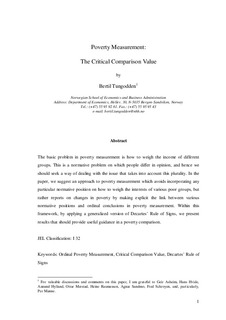| dc.contributor.author | Tungodden, Bertil | |
| dc.date.accessioned | 2006-09-06T06:35:45Z | |
| dc.date.available | 2006-09-06T06:35:45Z | |
| dc.date.issued | 1998-11 | |
| dc.identifier.issn | 0804-6824 | |
| dc.identifier.uri | http://hdl.handle.net/11250/163302 | |
| dc.description.abstract | The basic problem in poverty measurement is how to weigh the income of different
groups. This is a normative problem on which people differ in opinion, and hence we
should seek a way of dealing with the issue that takes into account this plurality. In the
paper, we suggest an approach to poverty measurement which avoids incorporating any
particular normative position on how to weigh the interests of various poor groups, but
rather reports on changes in poverty by making explicit the link between various
normative positions and ordinal conclusions in poverty measurement. Within this
framework, by applying a generalized version of Decartes’ Rule of Signs, we present results that should provide useful guidance in a poverty comparison. | en |
| dc.format.extent | 54905 bytes | |
| dc.format.mimetype | application/pdf | |
| dc.language.iso | eng | en |
| dc.publisher | Norwegian School of Economics and Business Administration. Department of Economics | en |
| dc.relation.ispartofseries | Discussion paper | en |
| dc.relation.ispartofseries | 1998:23 | en |
| dc.subject | ordinal poverty measurement | en |
| dc.subject | critical comparison value | en |
| dc.subject | Decartes' rule of signs | en |
| dc.title | Poverty measurement : the critical comparison value | en |
| dc.type | Working paper | en |
